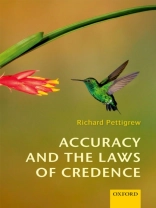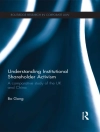Richard Pettigrew offers an extended investigation into a particular way of justifying the rational principles that govern our credences (or degrees of belief). The main principles that he justifies are the central tenets of Bayesian epistemology, though many other related principles are discussed along the way. These are: Probabilism, the claims that credences should obey the laws of probability; the Principal Principle, which says how credences in hypotheses aboutthe objective chances should relate to credences in other propositions; the Principle of Indifference, which says that, in the absence of evidence, we should distribute our credences equally over all possibilities we entertain; and Conditionalization, the Bayesian account of how we should plan torespond when we receive new evidence. Ultimately, then, this book is a study in the foundations of Bayesianism. To justify these principles, Pettigrew looks to decision theory. He treats an agent’s credences as if they were a choice she makes between different options, gives an account of the purely epistemic utility enjoyed by different sets of credences, and then appeals to the principles of decision theory to show that, when epistemic utility is measured in this way, the credences that violate the principles listed above are ruled out as irrational. The account of epistemic utility set out here is theveritist’s: the sole fundamental source of epistemic utility for credences is their accuracy. Thus, Pettigrew conducts an investigation in the version of Iepistemic utility theory known as accuracy-first epistemology. The book can also be read as an extended reply on behalf of the veritist to theevidentialist’s objection that veritism cannot account for certain evidential principles of credal rationality, such as the Principal Principle, the Principle of Indifference, and Conditionalization.
Richard Pettigrew
Accuracy and the Laws of Credence [PDF ebook]
Accuracy and the Laws of Credence [PDF ebook]
Beli ebook ini dan dapatkan 1 lagi GRATIS!
Bahasa Inggris ● Format PDF ● Halaman 256 ● ISBN 9780191047251 ● Penerbit OUP Oxford ● Diterbitkan 2016 ● Diunduh 3 kali ● Mata uang EUR ● ID 5280600 ● Perlindungan salinan Adobe DRM
Membutuhkan pembaca ebook yang mampu DRM












